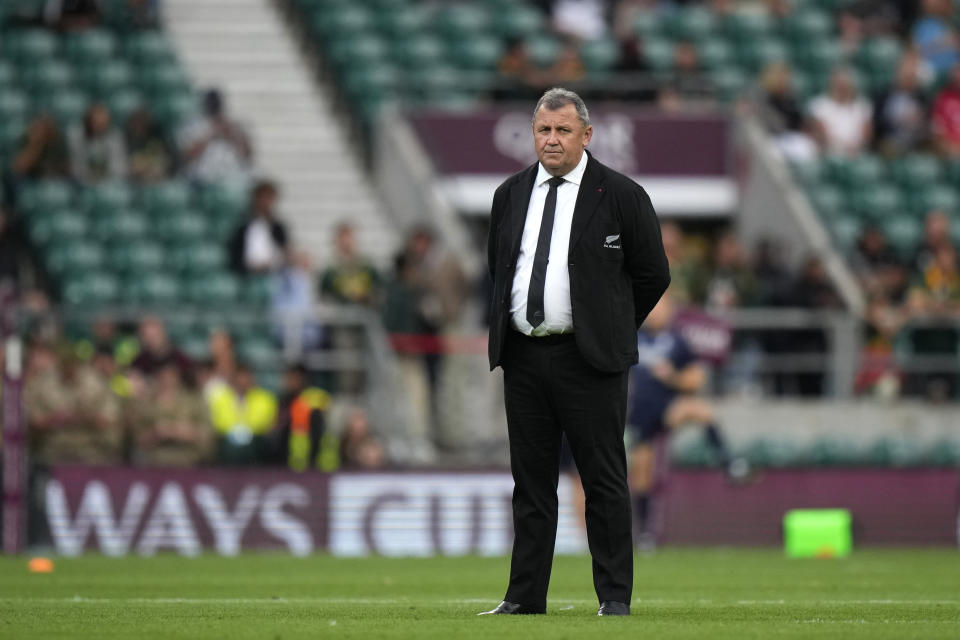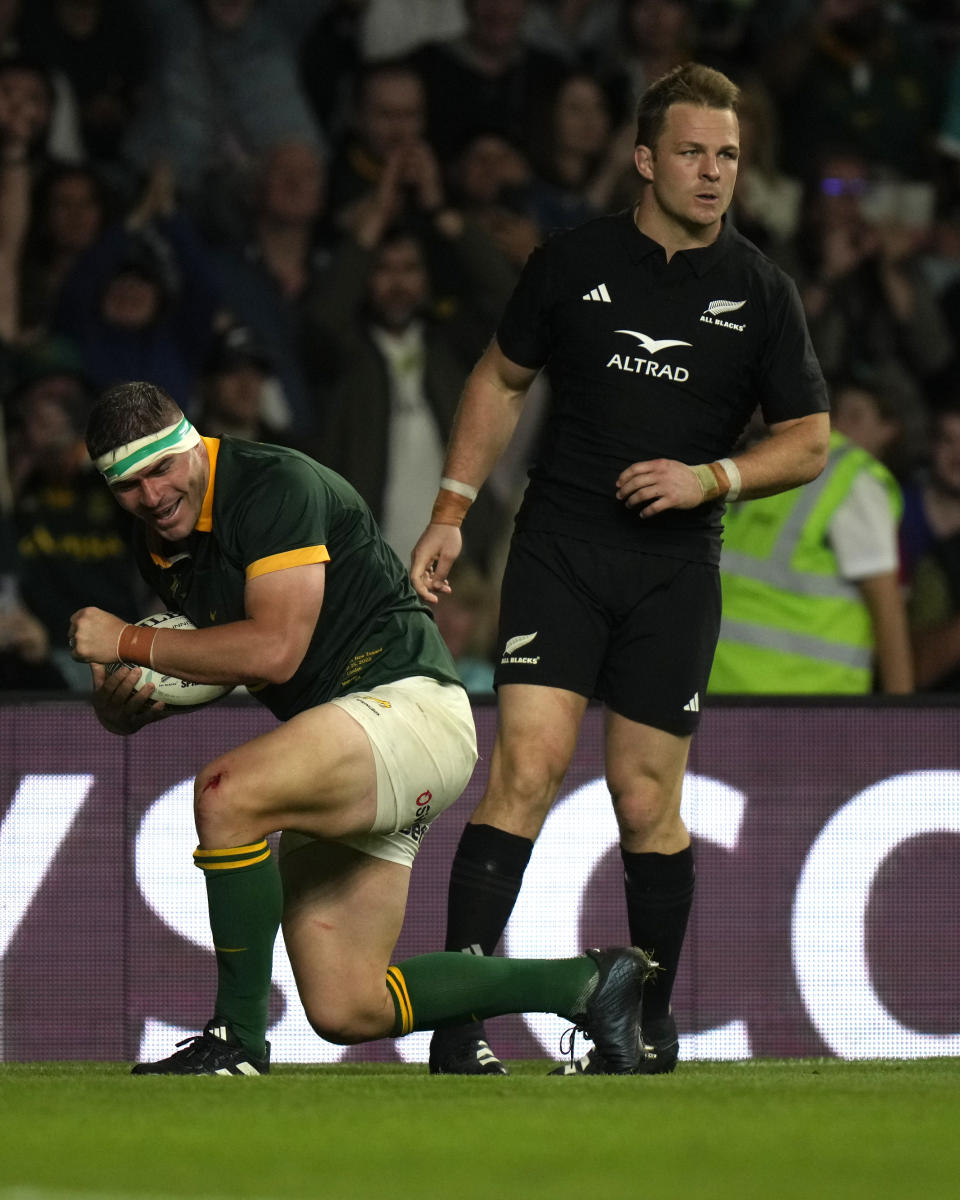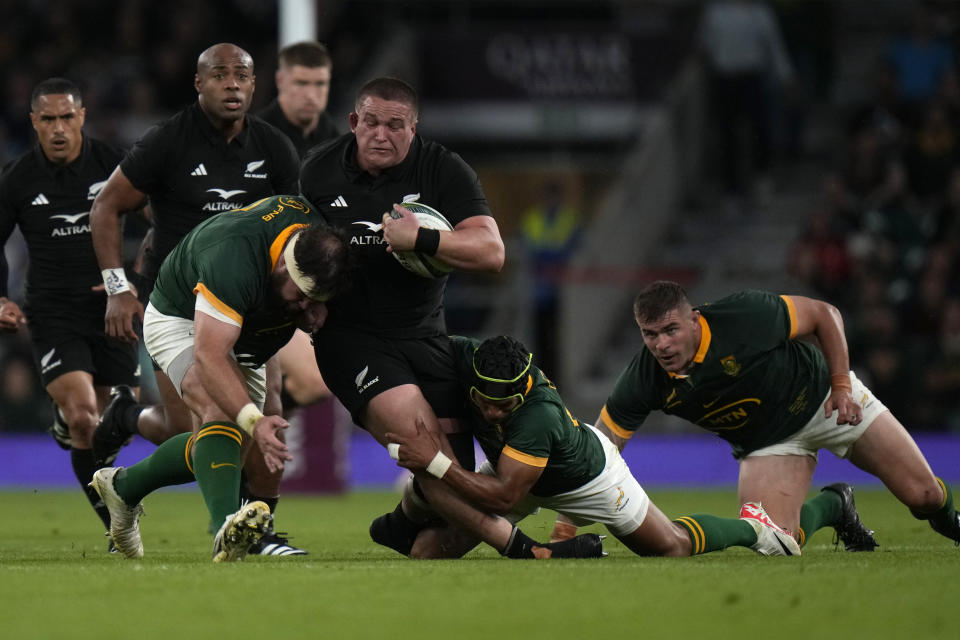All Blacks' Rugby World Cup stocks drop after old flaws resurface in Springboks thrashing
WELLINGTON, New Zealand (AP) — New Zealanders’ growing confidence in the All Blacks’ prospects at the Rugby World Cup has been punctured by the record loss to world champion South Africa in its last warmup.
The 35-7 defeat at neutral Twickenham was New Zealand’s largest in a test match and revived all of the concerns that arose during the 2022 season in which the All Blacks were beaten in three consecutive tests at home for the first time.
Those worries subsided a little when the All Blacks won their first four tests this year, beating the Springboks to win the Rugby Championship and Australia, twice, to retain the Bledisloe Cup.
The wins over Australia gained new context from France's recent 41-17 win over the Wallabies which was more comprehensive than either win the All Blacks achieved.
Coach Ian Foster has advanced as factors in the All Blacks’ loss to South Africa a lack of recent match play, the three yellow cards and subsequent red card the team received and the significant injury to prop Tyrel Lomax.
But Foster and his fellow selectors made the risky decision to play the All Blacks’ strongest lineup in the match and the fact that his best lineup was mauled so thoroughly by the Springboks allows little room for mitigation.
“It’s actually OK to be psychologically down after a game like that because you put so much into it,” Foster said. “But when you look at the bigger picture about what we wanted to achieve from that game, to be fair we got everything we expected. We just didn’t deal with it as well as we expected. We’ve just got to fix that.
“But we’ve got a lot of belief in what we’ve been doing and we know that the first game of the World Cup is big and it’s going to be just like that. We’ll probably be attacked in a very similar way.”
The confidence of the New Zealand squad must have been dented by the nature of the loss which came with only two weeks to make effective repairs before the opening match of the World Cup against France on Sept. 8 in Paris.
New Zealand supporters have a growing fear the defeat was not an aberration but a recurrence of an endemic problem. Apart from the deficiency in set-pieces and general forward play there were other recurrent problems: A lack of composure in defense and under pressure, poor tactical decision-making and a lack of discipline.
There’s no doubt the All Blacks have some of the most exciting backs in the world: Richie Mo’unga and Beauden Barrett, Will Jordan and Rieko Ioane. But the manner in which the All Blacks forwards were physically dominated by South Africa raises questions about whether they will be able to provide a platform for the backs against top-tier teams at the World Cup.
Lomax has a cut to his thigh which required 30 stitches and he along with lock Brodie Retallick and back-rower Shannon Frizell are in doubt for the match against France, a crucial game for the All Blacks.
The forwards appeared to have been making progress, after disappointing performances in 2022, with the introduction of Crusaders assistant Jason Ryan as forwards coach. That impression was enlarged by early season performances this year, particularly the 35-20 win over South Africa. Lomax had been a key figure in the revival, providing a solid anchor for the scrum on the tighthead side.
But the performance against the Springboks in London was a setback and was reminiscent of the 2019 World Cup semifinal against England in which New Zealand was physically dominated. In the absence of Lomax, the All Blacks pack begins to look older and less formidable.
The All Blacks have never lost a pool match at a World Cup and a loss to France would be a major blow. New Zealand still likely would emerge from its pool and could emulate South Africa, which lost to the All Blacks in pool play in 2019 and went on to win the tournament.
But a loss would alter New Zealand’s route in the knockout rounds and raise the possibility of facing South Africa in a quarterfinal. That’s another of the dark clouds gathering over the All Blacks.
There may be a mathematical quotient which represents the correlation between the confidence of All Blacks fans before a World Cup and the team performance.
In 2003, fans were confident and the All Blacks lost to Australia in the semifinals. In 2007 more confident and New Zealand suffered its earliest ever World Cup exit. In 2011, the confidence was overwhelming and New Zealand won the Cup for the first time in 24 years but only by a point over France in the final. In 2015 the high degree of confidence was supported by the All Blacks' third world title. In 2019, subdued confidence was borne out by a semifinal defeat.
Foster in his campaign with the All Blacks has a tough task to rise above low expectations.
___
AP rugby: https://apnews.com/hub/rugby





